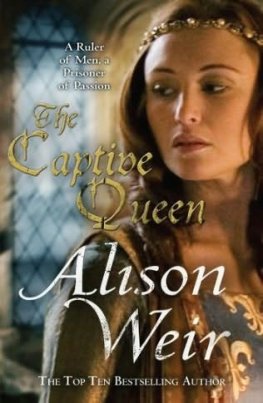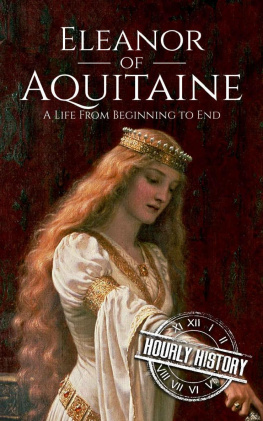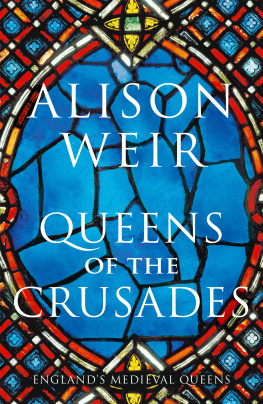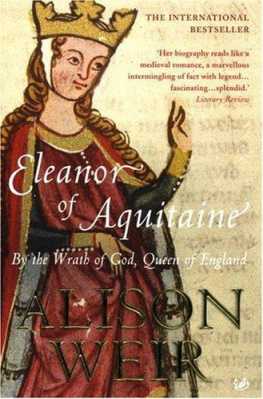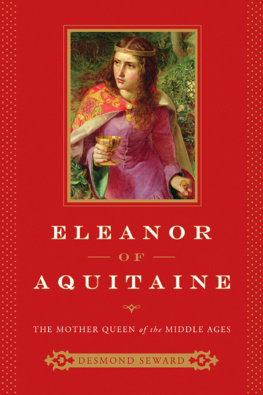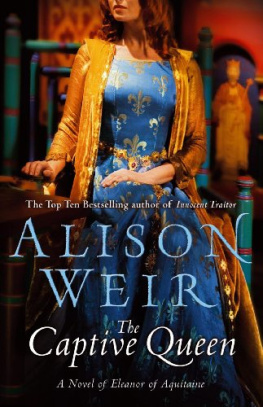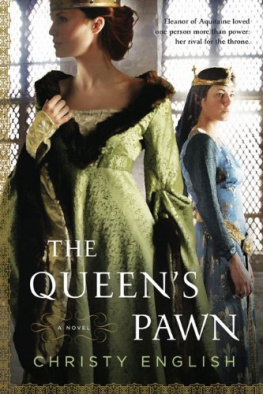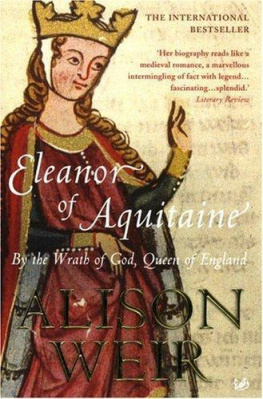The route which Eleanor and Louis followed on the Second Crusade.
Eleanors movements during her retirement.
PREFACE
The Changing Faces of Eleanor
Do we know what we think we know about Eleanor?
RaGena DeAragon
The Eleanor of history has been overshadowed by an Eleanor of wishful thinking and make-believe.
Professor Nicholas Vincent
Writing about Eleanor of Aquitaine has been a very different experience to writing about Eleanor of Castile. With the latter, my almost universal experience was that people had no idea at all who she was. Indeed, if they claimed they had any idea, they were probably confusing her with Eleanor of Aquitaine. With the senior Eleanor, however, the experience has been in this respect wildly different nearly everyone has some idea of who Eleanor of Aquitaine was. Indeed, some rather implausible people including a number of senior members of the English judiciary have outed themselves as Eleanor of Aquitaine fans. The problem this time around has been more that I have found myself disappointing people by telling them that what they think they know about Eleanor probably isnt true. I am now quite used to a look which mixes disappointment with a measure of disbelief when I deliver this news.
This is a key point for which my readers should be prepared before they go any further into this book. What you think you know about Eleanor may not be true. Indeed, this book will suggest that many so-called facts about Eleanor and her life are false, or at best unsupported by evidence. I know that there are a lot of Eleanor fans out there with very clear views of who she was, what she did and just how exceptional a woman she was. I know this not least because I started writing this book as one of them. I have read and enjoyed just about every biography of Eleanor and also many of the excellent historical novels which take her as their heroine. I was very fond of the picture which they gave me. I did not start writing this book with any great thoughts of debunking accepted views. In truth, Eleanor had long been my idea of a dream subject because, love them as I did, I did not find any of the existing biographies entirely satisfactory and because the kind people at Amberley offered me my choice of subject. With that offer there, I simply wanted to see if I could do any better.
When writing about Eleanor of Castile, I began with a vague idea of what I might find and what I found was that and much, much more. She was a woman who was not billed as in any way exceptional, but proved to be so to the extent that I still think of her as a rather terrifying role model. With Eleanor of Aquitaine, the experience has been rather more disconcerting; I started with a clear idea of what I might find, and while some of this was confirmed I also found some things which I never expected. I also found that some long-cherished beliefs had to be given up. Most shockingly, I found that some of the supposedly established facts espoused in a number of biographies were actually groundless speculation; I also found instances where biographers had accepted as fact stories which fall apart under the slightest critical scrutiny.
Part of this is down to a central problem inherent in writing about Eleanor. She was born nearly nine hundred years ago into a world which ceased to exist even before the Renaissance. To some extent, therefore, any search for a truthful image of her is almost impossible this is guaranteed by the scarcity of material and our inability, with our modern prejudices, to properly comprehend what we do have. The history of biographical study of Eleanor has illustrated amply the temptation of reading current trends across to the examination of her life. It is this which has led to the mantra of Eleanor as the hyper-exceptional woman, which the facts do not sustain. But the fact that capturing something like a true image is very difficult is no reason not to try.
The picture of Eleanor that has emerged from my study shows her to be somewhat less exceptional, somewhat less of a rebellious feminist icon and considerably less of a player in the genesis of troubadour poetry and chivalric ideals than most existing biographies would suggest. This may not come as a big surprise to some readers recent years have seen much revisionist scholarship on the subject of Eleanors life. The articles in Eleanor of Aquitaine Lord and Lady (ed. Wheeler and Parsons) and Plantagenets et Capetiens (ed. Aurell) are key to this reassessment, as is the brilliant Inventing Eleanor by Michael Evans. Two sets of articles deserve special mention. The first is Labandes 1952 work Pour une image vridique dAlinor dAquitaine, which was at the forefront of scholarly reassessment of Eleanor. The second is Jane Martindales magisterial collection of articles on Eleanor and Eleanors later life. I, among others, had hoped that Martindale would release a full definitive biography of Eleanor. Had she done so, I strongly suspect that this book would not have been written.
I have gratefully absorbed the thoughts of the academics who have so carefully re-evaluated aspects of Eleanors life. The place where I have landed in my assessment of Eleanor has been much influenced by their reasoning. As I have said, that place is to see Eleanor as a much less exceptional figure than she has often been portrayed as being particularly in her early years, but also to an extent in her famed later flowering. Having said that, I do nonetheless find her very inspiring, particularly in two respects. The first is in her resolution in dealing with unbelievably difficult circumstances repeatedly and throughout her life so much so that I now regard her as something of a poster girl for resilience. The second, perhaps apt to someone of my age, is her willingness to embrace considerable change and responsibility at a time in life when it is tempting, now as then, to think that the game is played out and that starting afresh is impossible. One other thing that very much surprised me: I find her a much warmer and nicer person than I had anticipated, which has been a great pleasure. She comes across as a much better mother than her reputation would suggest. If I had a personal problem and I had a choice of the two Eleanors to take it to, Id pick Eleanor of Aquitaine every time.


